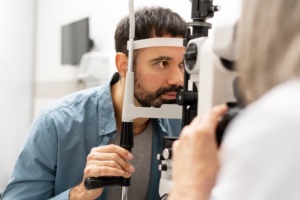What Is Minimally Invasive Glaucoma Surgery?
Learn MoreCorneal Transplant
What is a Corneal Transplant?
The cornea is a dome-shaped tissue that serves as the outermost layer of the eye. It acts as a natural protector of the rest of the eye, keeping debris and particles from invading its deeper layers. In addition, it distributes light through the pupil to the rest of the eye, acting almost as a “window.” These important functions make the cornea an irreplaceable part of the eye.
Unfortunately, the position of the cornea makes it vulnerable to significant infection and harm. Concerns such as scarring, swelling, or injury to the cornea can impair vision and cause pain. In such cases, our board-certified ophthalmologists can perform a corneal transplant with donated tissue. Surgical strategies vary based on the particular cause or area of damage, but on the whole, corneal transplant surgery has proven highly successful in easing discomfort and restoring overall function to the eye.
- Corneal Transplant Benefits
- Corneal Transplant Candidates
- Cornea Damage Causes
- Types of Corneal Transplants
- Corneal Transplant Recovery
- Corneal Transplant Side Effects
- Corneal Transplant Cost
- Corneal Transplant & Insurance
- How to Choose a Corneal Transplant Surgeon
- Additional Corneal Transplant FAQs
What Are the Benefits of Corneal Transplant Surgery?
A damaged or infected cornea can not only make day-to-day activities frustrating and difficult, but can also lead to more serious health issues. Corneal transplant surgery can alleviate many of these problems and may offer multiple long-term benefits. The procedure can be utilized to restore vision and reduce potential pain. If a cornea is damaged or diseased, corneal transplant surgery can also improve the appearance.
Who Is a Good Candidate for Corneal Transplant?
Many patients struggle with eye issues that can be corrected or addressed with corneal transplant surgery. This common procedure is designed to improve eyesight and many patients have found success with surgery. Typically, candidates for a corneal transplant are experiencing one or more symptoms, such as:
- Corneal failure from a previous procedure, like cataract surgery
- Corneal rejection after an original corneal transplant
- Fuchs’ corneal dystrophy (severe fluid buildup within the cornea)
- Keratoconus (harmful distortion of the cornea’s shape)
- Blurry vision that doesn’t improve with contact lenses or other procedures
- Weakened cornea
- Eye pain and discomfort
Corneal transplants are considered a safe procedure when performed by a qualified surgeon, and few patients are deemed ineligible for this surgery. That said, one of our ophthalmologists will examine you before moving forward with the procedure to determine both your candidacy and the precise area of concern. If you suffer from glaucoma, your surgeon may suggest a separate treatment, such as Argon laser trabeculoplasty (ALT), be performed before you proceed with corneal transplant to avoid complications.
What Causes a Cornea to Become Damaged or Infected?
Cornea damage and eyesight degeneration can be caused by a variety of factors. Possible causes include:
- Eye trauma or injury
- Corneal ulcers
- Cysts
- Corneal swelling due to an eye disease or previous surgery
- Infection from contact lenses
- Inherited disorders
What Are the Different Types of Corneal Surgery?
Because a corneal transplant is tailored to specifically address the patient’s needs, a number of different approaches exist. The surgery can either directly address the cornea as a whole or focus on one of its five layers (particularly the external-facing epithelium, or the endothelium, which lines the inner corneal surface).
Penetrating Keratoplasty
Penetrating keratoplasty (PK) involves the replacement of the cornea with a graft from a human donor. The most traditional method, a typical PK surgery will include the removal of the damaged tissue before the replacement is attached with sutures. Note that tissue rejection, in which the replacement is not compatible with the rest of the eye tissue, is a possible complication in PK surgeries; however, an experienced ophthalmologist will prevent this issue to the best of their ability.
DSAEK
DSAEK, or Descemet’s Stripping Automated Endothelial Keratoplasty, is what’s called a partial-thickness corneal transplant. In this procedure, Dr. Sumsion replaces only the thin endothelial layer of the cornea with donor endothelial tissue. This procedure typically allows for faster healing when compared to a full corneal transplant, resulting in a faster return of vision. Since the majority of the original cornea is kept in place, DSAEK involves less risk of tissue rejection.
Generally, your corneal transplant will take place as an outpatient procedure with local anesthesia.
What Is Recovery from Corneal Transplant Surgery Like?
As the recovery process following corneal transplant depends on the specifics of the surgery itself, our ophthalmologists create personalized aftercare plans for each patient. You may be prescribed eye drops, which you should take as directed. Additionally, we recommend that patients avoid touching or rubbing the surgical area as it heals.
Although most patients are able to resume daily activities soon after the surgery, we ask that you find someone to drive you to our office, as blurriness is to be expected initially. Soreness is also common immediately following surgery, but can be treated with over-the-counter pain medications.
Does a Corneal Transplant Have Side Effects?
While a cornea transplant is typically considered a safe procedure when performed by an experienced surgeon, there are potential risks. Possible side effects and complications include eye infection, glaucoma, rejection of the donor cornea, and retinal problems.
Our ophthalmologists at Riverside EyeCare Professionals take great care to provide patients with a comfortable experience and are highly skilled at performing corneal transplants. They recognize potential side effects from surgery and are equipped to perform a successful procedure.
How Much Does a Corneal Transplant Cost?
The cost of corneal transplant surgery will depend on the extent of work done to the eye, anesthesia and hospital fees, and more. As stated earlier, we invite each patient to come in for a consultation before their procedure, during which we will discuss the plan for surgery and go over financial options. Please note that we accept all major credit cards and work with CareCredit®, a third-party lender that can help arrange flexible payment plans for several conditions and treatments.
Does Insurance Cover Corneal Transplant?
Corneal transplant surgery is typically covered by insurance when deemed medically necessary and many medical insurance plans can help reduce the cost of the procedure. We are also happy to speak with insurance providers where applicable.
How to Choose a Corneal Transplant Surgeon?
It’s important to choose a corneal transplant surgeon who is exceptionally qualified and skilled. It’s key that prospective surgeons are up to date on the latest training, treatments, and techniques to increase the likelihood of success. Additionally, corneal transplant surgeons should have ample experience, and knowledge of advanced post-operative care to minimize potential complications.
Additional factors to consider when choosing a corneal transplant surgeon include:
- Research educational background, experience, and professional memberships.
- Inquire about available procedures and state-of-the-art practice equipment.
- Ask about financing and payment options.
- Read patient testimonials and reviews.
Additional Frequently Asked Questions About Corneal Transplants
How do I prepare for a corneal transplant?
To prepare for a corneal transplant, one of our eye doctors will perform a thorough eye exam and review your medical history to ensure you’re an ideal candidate for this procedure. You may be asked to temporarily stop certain medications, especially blood thinners. We suggest patients preemptively arrange for someone to drive them home after surgery, as vision will be affected. Follow any pre-operative instructions closely, which may include using prescribed eye drops and avoiding food or drink for several hours before the procedure. Our team will provide personalized guidance before your procedure to help ensure optimal outcomes.
How can I protect my corneal transplant results?
To protect your corneal transplant results, follow all post-operative instructions carefully. This may include using prescribed eye drops as directed to prevent infection and rejection. It is also best to avoid rubbing or putting pressure on your eye, and wear protective eyewear as advised, especially during sleep or physical activity. It is recommended that patients attend all follow-up appointments to monitor healing and address any issues early. It is also important to watch for signs of rejection—such as redness, pain, light sensitivity, or vision changes—and report them immediately. Additionally, avoid strenuous activity and environments that increase your risk of eye injury. With proper care and regular monitoring, many patients maintain clear vision and long-term transplant success.
Will I need another corneal transplant in the future?
Most corneal transplants are successful and can last many years, often decades. However, some patients may eventually need another transplant due to graft rejection, disease recurrence, or age-related changes. Regular follow-up care and using prescribed medications can help extend the life of the graft. If signs of rejection or graft failure appear, early treatment can sometimes reverse the issue. While a repeat transplant is not always necessary, your doctor can monitor your vision and corneal health over time to determine the best course of action if any changes occur.
How long does the surgery take?
Corneal transplant surgery typically takes between one to two hours, depending on the type of transplant and the complexity of the case. Some procedures, like partial-thickness transplants, may be shorter, while full-thickness transplants can take a bit longer. Our eye doctors will provide specific details based on your individual treatment plan.
If you believe you are in need of a corneal transplant, please contact Riverside EyeCare Professionals today.

